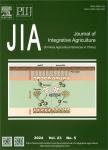Effect of temperature on the development of sclerotia in Villosiclava virens
Effect of temperature on the development of sclerotia in Villosiclava virens作者机构:The State Key Laboratory of Rice BiologyBiotechnology InstituteZhejiang UniversityHangzhou 310058P.R.China Plant Protection Station of Xiangshan CountyXiangshan 315700P.R.China Crop Science InstituteZhejiang UniversityHangzhou 310058P.R.China
出 版 物:《Journal of Integrative Agriculture》 (农业科学学报(英文版))
年 卷 期:2016年第15卷第11期
页 面:2550-2555页
核心收录:
学科分类:09[农学] 0904[农学-植物保护] 090401[农学-植物病理学] 090402[农学-农业昆虫与害虫防治]
基 金:financially supported by the National Natural Science Foundation of China(31271999) the Special Fund for Agro-scientific Research in the Public Interest,China(200903039-5)
主 题:Villosiclava virens Ustilaginoidea virens rice false smut sclerotial formation temperature
摘 要:The sclerotia of Villosiclava virens were found commonly in high altitude and the temperate regions, where the temperatures are relatively low in rice filling stage. To make sure if low temperature induce the sclerotial formation in V. virens, the inoculated rice panicles in laboratory and the diseased rice panicles cut from paddy fields were treated under different temperatures. The results showed that 3 days of night temperature at 15°C were enough to induce the sclerotial formation. The low temperature was much more effective for young balls with intact membranes. After appearance of chlamydospores on the ball surfaces, the sclerotium could not differentiate anymore. The sclerotia began to differentiate below the chlamydospore layer and gradually grew onto the ball surfaces. This suggests that low temperature in the early development stage of false smut balls is an important factor to induce the sclerotial differentiation, and rice cultivars with long growth periods are able to produce more sclerotium-bearing balls, which will produce mass of spores in paddy field in the coming year.



